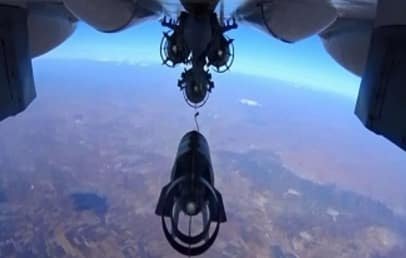This territory has never been in the hands of the Islamic State, deputy chief of the Russian General Staff Andrey Kartapolov points out
MOSCOW, October 16. /TASS/. Traces of airstrikes against household buildings have been found at the Syria-Jordan border, where Russian warplanes have performed no missions, deputy chief of the Russian General Staff Andrey Kartapolov said on Friday.
“We have spotted ruins of household buildings destroyed by bombing near the settlement of Kherbet Ghazala at the Syrian-Jordan border,” he told a briefing for foreign military attaches and journalists.
“Russian warplanes have never performed any missions there and, as far as we know, the Syrian aviation has not been used there either,” he stressed. “This territory has never been in the hands of the Islamic State. Moreover, this area has been controlled by the Free Syrian Army since 2013.”
He demonstrated photos of the area featuring bomb-destroyed buildings. “You can see on these photos that there are no signs of military activity around these cottages, there are no military hardware, not even signs of military hardware. These are regular gardens and fields with buildings to keep farming tools,” he said.
“Why destroy these buildings? It looks like somebody’s pilots were just training their skills or dropped bombs to report to their command about completed mission,” Kartapolov said.
Airstikes by US-led coalition in Syria increase refugee flow to Europe
Airstrikes of US-led coalition on civilian facilities on the Syrian territory lead to increasing refugee flows to the European Union, Kartapolov went on to say.
“Over the last two weeks, we have provided enough video materials confirming the precision of [Russian] airstrikes. Our jets deliver airstrikes at facilities located outside of settlements,” Kartapolov said.
“It is not in our rules to advise colleagues on where to deliver their airstrikes. However, on October 11, near the settlement of Tel-Alam, the coalition’s jets destroyed by airstrikes a thermal power plant and transformer substation,” he added. As a result, hospitals and schools in Aleppo were left without electricity. Water pumping stations and sewage also stopped working which can be very harmful in the conditions of high temperatures.
“I think that it is unlikely that our partners did not know that the thermal power plant worked only eight hours per day. Airstrikes were delivered for several days, and on October 11, the power station was completely destroyed. One might get an impression that someone is deliberately destroying infrastructure in settlements, thus making the life of local population impossible. Because of that, civilians leave these settlements after losing living conditions and increase the refugee flow to Europe,” Kartapolov noted.

Gordon Duff posted articles on VT from 2008 to 2022. He is a Marine combat veteran of the Vietnam War. A disabled veteran, he worked on veterans and POW issues for decades.
Gordon is an accredited diplomat and is generally accepted as one of the top global intelligence specialists. He manages the world’s largest private intelligence organization and regularly consults with governments challenged by security issues.
Duff has traveled extensively, is published around the world, and is a regular guest on TV and radio in more than “several” countries. He is also a trained chef, wine enthusiast, avid motorcyclist, and gunsmith specializing in historical weapons and restoration. Business experience and interests are in energy and defense technology.
ATTENTION READERS
We See The World From All Sides and Want YOU To Be Fully InformedIn fact, intentional disinformation is a disgraceful scourge in media today. So to assuage any possible errant incorrect information posted herein, we strongly encourage you to seek corroboration from other non-VT sources before forming an educated opinion.
About VT - Policies & Disclosures - Comment Policy





